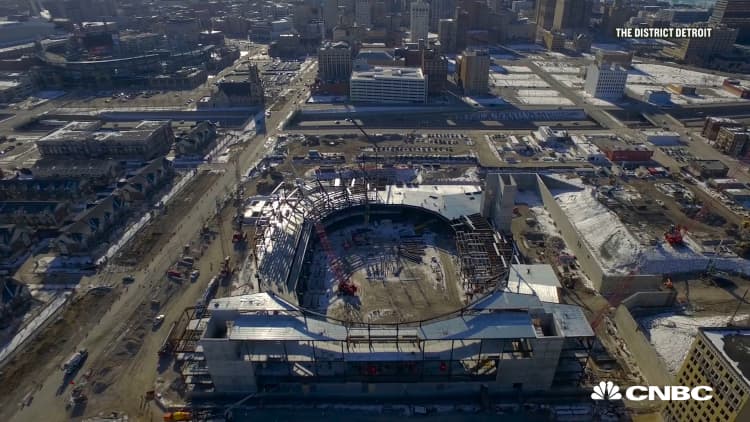Detroit has had a remarkable recovery. Motor City filed the nation's largest ever municipal bankruptcy just three years ago, after suffering from an unemployment rate that reached a staggering 28 percent. Since then, the city has battled its way back from a Chapter 9 filing and unemployment has recovered to a low six percent.
But Detroit is still plagued by one fact: Its population is dwindling.
Detroit covers 143 square miles and is roughly the size of San Francisco, Boston and Manhattan combined, but it is inhabited by under 700,000 people. For the first time since 1850, the Motor City ranks outside the nation's top 20 largest cities.
Now the city is banking on at least one project — a $627 million new arena that the National Hockey League's Detroit Red Wings will call home — to lure investment, and people, back downtown. Detroit's Downtown Development Agency is providing $250 million in financing through tax-exempt municipal bonds, with the remaining costs absorbed by a subsidiary of the Red Wings-owning billionaire family the Ilitches, who also own the Detroit Tigers and founded Little Caesars Pizza.
Taxpayer-backed stadium deals have increasingly drawn outrage for not proving to be wise public investments and attracted the ire of commentators such as HBO's John Oliver. In the latest example, the Reno Gazette Journal denounced a proposed stadium deal backed by $750 million in public money that could lead to bringing the NFL's Oakland Raiders to Las Vegas. Despite opposition, Nevada's lawmakers approved the plan last week.
But in this case, Little Caesars Arena isn't all that the public stands to gain.
The Ilitches have also promised nearly $2 billion to develop over 1.6 million square feet surrounding the arena, dubbed The District Detroit. That will transform about 50 mostly blighted blocks between the city's uptown and core into a mix of residential units, retail space, and hotels.
"I would say the state got the deal of a lifetime," Chris Ilitch says. "The state stepped up with about $250 million in seed money and instead of getting a $650 million development, they've gotten a $2 billion development."
Beyond that, Ilitch highlights the effort the project has made to keep contracts with local businesses. They have exceeded their goals so far, with about $500 million, or 93 percent of contracts, signed with Michigan firms, including about $300 million going to Detroit-based companies, Ilitch says. He adds that the project "is projected to have a $2.1 billion economic impact on our city, our region and our state."
Some critics of the deal contest that the city left a bit more on the table than it should have.
For example, Detroit did not sign a revenue sharing agreement like the one it had in place at the old Joe Louis Arena, through which the city received a cut of ticket sales, concession sales, and souvenir sales. That added up to around $7 million in revenue for the city annually, according to the Detroit Free Press. In that arrangement, however, the city covered the entire cost of the arena in 1977, about $227 million in inflation-adjusted dollars, to keep the Red Wings from moving to the suburbs.
Two negotiators representing the city, who have since jumped ship to work with Ilitch's holding company, insisted the agreement was the best possible outcome for both sides, considering it included only $250 million in public funding.
Even some economists — generally not known for being ardent supporters of publicly financed stadiums — are seeing some positives in the deal that was much maligned when it was approved during Detroit's bankruptcy.
A rendering of a portion of The District Detroit shows where initial development will take place. (Source: Olympia Development of Michigan)
"Certainly from what I've seen in Detroit this looks good," University of Alberta professor Dan Mason says, adding that the level of private development in the area around the arena is unique.
"You can't downplay the importance of having a corporate partner, a business partner who has a strong interest in helping the city," he says. "This isn't to say that the private sector is not going to make a significant amount of money here, but there is a willingness on the part of the private sector to try and do something to help the city because they recognize it's in everyone's interest to do so."
Stanford sports economist Roger Noll echoes the potential for success, noting that sports facilities encapsulated by a larger development project are less likely to be financial disasters for cities.
Fellow billionaire Detroiter Dan Gilbert, founder of Quicken Loans and owner of the Cleveland Cavaliers, is hopeful he can continue to build off the excitement downtown by bringing a Major League Soccer franchise to Motor City as well. Until then, the Ilitch family and the rest of Detroit are looking forward to 2017 to see what kind of returns are paid on their investments.
"We have always taken it very seriously in terms of trying to build highly competitive world class sports teams because we know that makes a huge impact on people's feeling about their community, building the pride and bringing people together," Ilitch says.
Want more revitalization through business? Watch CNBC's "Cleveland Hustles" from executive producer LeBron James on demand now.



